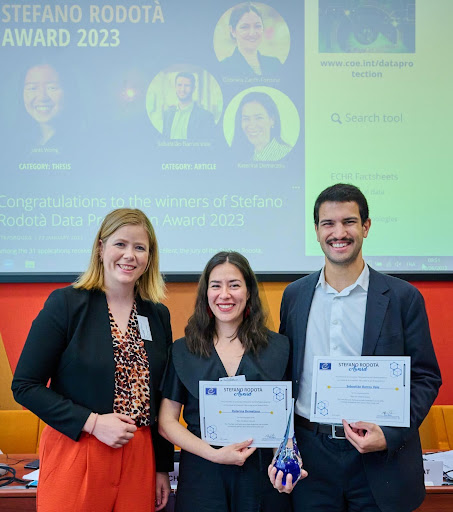FPF Paper, “The Thin Red Line …,” Receives the Council of Europe’s 2023 Stefano Rodotà Award
On Friday, June 16th, members of the FPF team joined the 44th Plenary meeting of the Council of Europe’s Committee of Convention 108 in Strasbourg, France to accept a tremendous research honor. On this occasion, Katerina Demetzou, Senior Counsel for Global Privacy, Dr. Gabriela Zanfir-Fortuna, VP for Global Privacy, and Sebastião Barros Vale, former Senior Counsel for Europe at FPF, received the 2023 Stefano Rodotà Data Protection award in the category of ‘best academic article’ for their paper, “The Thin Red Line: Refocusing Data Protection Law on Automated Decision-Making, A Global Perspective with Lessons from Case-Law.” Demetzou and Barros Vale were present in Strasbourg during the Plenary meeting to present the paper and lift the award.
The Council of Europe (CoE), founded in 1949, is an international organization with 46 Member States and 6 Observer States. All Council of Europe Member States have signed up to the European Convention of Human Rights (ECHR), a treaty designed to protect human rights, democracy, and the rule of law. The European Court of Human Rights (ECtHR) oversees the implementation of the ECHR in the Member States.
Demetzou, Barros Vale, and Dr. Gabriela Zanfir-Fortuna, VP for Global Privacy at FPF, are honored to receive recognition at the birthplace of the CoE’s historic 1981 treaty, the Convention for the Protection of Individuals with Regard to Automatic Processing of Personal Data. Convention 108 established the first legally binding international instrument in data protection, and the CoE adopted the modernized Convention 108+ in 2018. A year later, the Convention 108+ Committee established the Stefano Rodotà Award to honor the memory and legacy of Stefano Rodotà (1933-2017), a leading Italian Professor and politician, and one of the founding fathers of data protection law in Europe. The Stefano Rodotà Award is awarded to precedent-setting and innovative research in the field of data protection. The dedicated academic, intellectual, and political influence of President Rodotà lives on through Demetzou, Barros Vale, and Dr. Zanfir-Fortuna’s global exploration of data protection instruments safeguarding individuals against harms from ADM in emerging technologies.
“The Thin Red Line” analyzes the legal protection provided by data protection law to individuals that are being subjected to automated decision making (ADM) on the basis of their personal data. To that end, the authors dedicate the first part of their research to an analysis of European Data Protection Authority (DPAs) enforcement actions of the GDPR on ADM cases. The second section looks to Brazil, Mexico, Argentina, Colombia, China and South Africa to explore protections against harmful ADM found in non-EU general data protection laws. The article concludes that even in cases where a processing operation does not meet the high threshold set by Article 22 GDPR (‘solely by automated means’), DPAs have made use of an array of legal principles, rights, and obligations to protect individuals against ADM practices, nonetheless. With the exception of Colombia, the other non-EU jurisdictions have a specific ADM provision. In all cases studied, the general data protection laws provide a broad material scope, such that any automated processing operation, solely or not, is regulated according to relevant provisions. Additionally, all laws studied include strong transparency and fairness requirements.
While the debate on a European Regulation for AI is ongoing, this paper aims to contribute to the discussion by highlighting that in cases where algorithms and AI systems process personal data, the GDPR is enforceable and protects individuals. Despite extensive legal scholarship on Article 22 GDPR, FPF’s experts identified a gap in previous literature through their global examination of existing enforcements and interpretations from regulators.
After the award ceremony, Demetzou was especially grateful for “the Committee’s warmth, as well as their committed understanding and appreciation for our research.” Dr. Zanfir-Fortuna called on the importance of the article’s findings while reflecting on emerging AI regulatory trends: “Data protection law has proved to be one of the most relevant existing legal frameworks to deal with the risks posed by the mass deployment of new AI tools. Existing legal obligations related to processing of personal data, on all continents, are stringent and more pressing than possible future AI legislation, as they are immediately applicable to existing AI systems.” The authors hope this intervention, as well as the paper’s global scan, will support researchers and policymakers in understanding how existing data protection law protects against potential harms from algorithms and AI systems.
For more, read “The Thin Red Line: Refocusing Data Protection Law on ADM, A Global Perspective with Lessons from Case-Law.”



